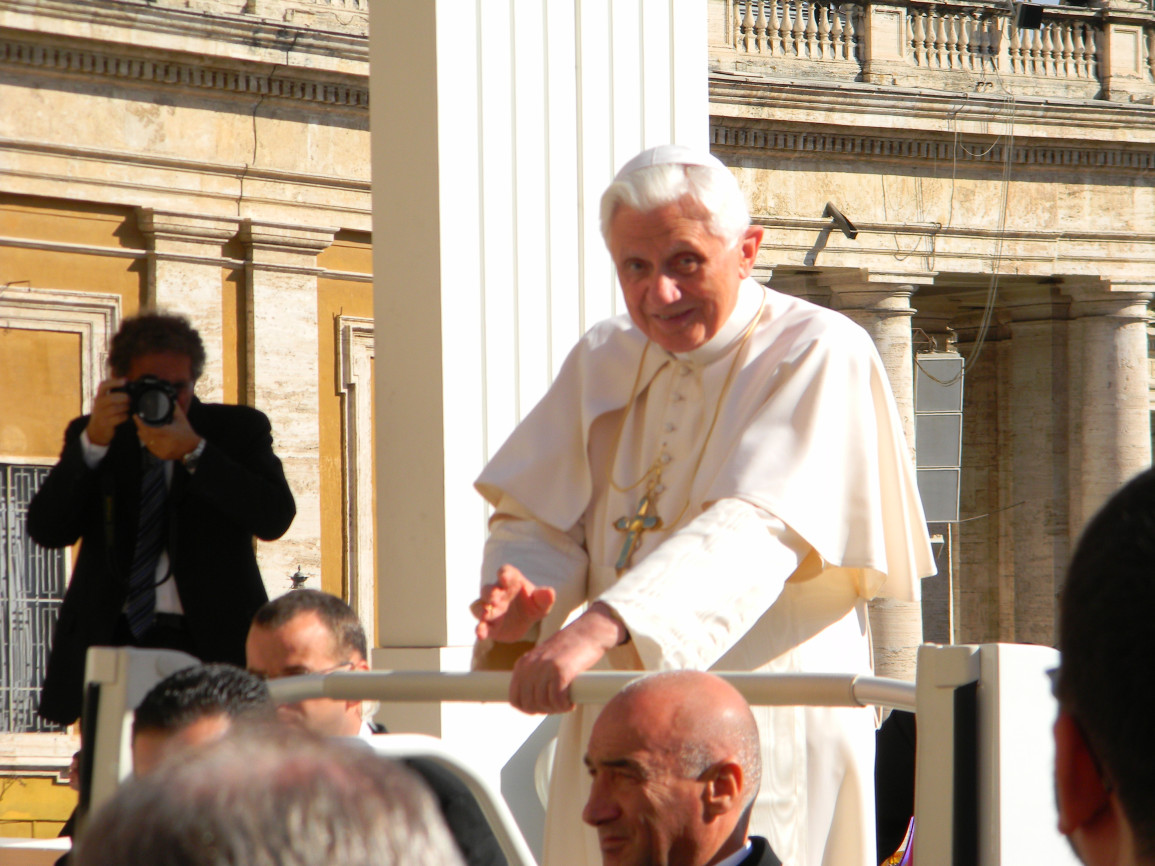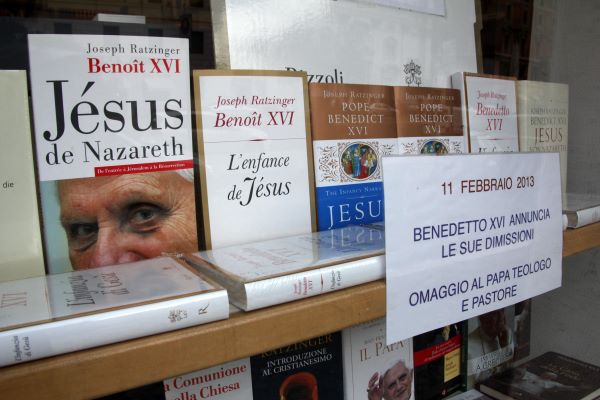The music swelled to a crescendo as the clouds of incense drifted up into the golden dome of St Peter’s Basilica, threatening to obscure the huge lettering, “Tu es Petrus”.
It was December 2005 and I was one of only two non-Romans attending the Second World Congress for the Pastoral Care of Foreign Students alongside hundreds of Catholic university chaplains from all over the world.
As the representative of the Archbishop of Canterbury and the Anglican Communion, I was honoured with an audience with Pope Benedict XVI at the end of the service. Having been introduced to the Holy Father by a cardinal archbishop from the Philippines in his accented Italian, I began, as a courtesy, to address him in German to pass on Archbishop Rowan Williams’s Christmas greetings. Hearing my terrible accent, he immediately responded in much better English.
Later I wondered if it would have been better if we had all just conversed in Latin. But it raised the important issue of translation, which is crucial for understanding Ratzinger as a theologian of the Bible.
In 1943, the young Ratzinger was conscripted at the tender age of 16 at just the same time as Pius XII promulgated his important encyclical, Divino Afflante Spiritu, which first encouraged Catholics to use historical criticism and the original languages in biblical studies. However, Ratzinger’s experience after the war as a young seminarian of the German Form-Critical methodology (which dominated European scholarship for most of the middle of the twentieth century) was not a happy one.
As he later wrote in his introduction to the first volume of his Jesus of Nazareth, for him historical-critical scholarship separated the “historical Jesus” from the “Christ of faith” with the result that “the real object of faith – the figure of Jesus – became increasingly obscured and blurred”.
In a movingly personal comment, he lamented that “intimate friendship with Jesus, on which everything depends, is in danger of clutching at thin air”. He described his three-volume biography of Jesus as “my personal search ‘for the face of the Lord’ (cf. Psalm 27:8)”.
This personal commitment to the figure of Jesus within the life of the Church dominated his attempt throughout his life and ministry to translate critical study of the scriptures for Christians today.
After a swift rise as a young professor in Germany, Ratzinger acted as a peritus, or theological adviser, to Cardinal Frings, Archbishop of Cologne, throughout the years of Vatican II, working particularly on the highly contested decree about the Bible as the Word of God, Dei Verbum. The arguments were so bitter that it went through no less than seven different versions before becoming the final document of the Council, promulgated by Pope Paul VI only a few weeks before it ended.
Throughout, despite his own painful experience as a seminarian, Ratzinger worked tirelessly against the conservatives’ attempt to condemn historical critical methods, as he later chronicled in his detailed 1969 commentary on the document, including analysing all the drafts and the debates. The decree begins with the statement that revelation is per Christum, Verbum carnem factum, “through Christ, the Word made flesh” – and this sets immediately this major theme for understanding Ratzinger’s Christological reading of the Bible, which has to be properly founded on both critical scholarship and the life of the Church.
However, the decree also goes on to affirm that God, as well as being the author and originator himself, chose and employed human agents as authors in the real or “true sense” with all “their powers and human faculties”, which means that we need our critical faculties to ascertain what the scripture writers “really intended to signify”, which includes paying proper attention to literary forms or “genres”.
This two-fold commitment – to both the intellectual life and to the Church – explains Ratzinger’s later development, which some interpret as merely a shift from being a “liberal” in the 1960s to a “conservative” later. The reality is much more complex and interesting than those easy labels suggest.
That constant desire to hold together good biblical scholarship about Jesus of Nazareth with the faith of the Church in him as Christ is what drives Ratzinger from the young seminarian and peritus at Vatican II through to the strictures of the later Pope.
This is best seen, perhaps, in his crucial 1988 Erasmus Lecture in New York for the Institute on Religion and Public Life, publishers of the American journal First Things. In this, Ratzinger delivers a blistering critique of the form-critical approaches of earlier German scholars like Bultmann and Dibelius, without retreating into an obscurantist fundamentalism. Instead, from a philosophical and theological perspective, he called for a new partnership between biblical exegesis and systematic theology.
This theme recurs throughout his subsequent works, such as his preface to the important 1993 Pontifical Biblical Commission document, The Interpretation of the Bible in the Church, and his 2002 L’Osservatore Romano article on the Catechism of the Catholic Church in which he states that “the living Christ is the genuine norm for interpreting the Bible”.
On becoming Pope, Benedict used his first homily in the Lateran Basilica on 9 May 2005 to stress the call of the Church to preach Christ through scriptural study. This was followed by a conference on “Sacred Scripture in the Life of the Church” on the fortieth anniversary of Dei Verbum in September 2005.
The first Synod of Bishops which he convened, in October 2008, led to his post-Synodal Exhortation on the Word of God, Verbum Domini, which not only reflects the title of Vatican II’s Dei Verbum, but describes how, “The Council emphasises the study of literary genres and historical context as basic elements for understanding the meaning intended by the sacred author”.
Meanwhile, Ratzinger began writing his own account of Jesus of Nazareth during the summer of 2003. Following his election as Pope in 2005, he gave “every free moment” to working on it until he published the first volume in 2007.
Here, he stresses that the historical-critical method “is and remains an indispensable dimension of exegetical work” but also that we need “a Christological hermeneutic which sees Jesus Christ as the key to the whole”, within what he calls “canonical exegesis”, the role of the Church as the “People of God”.
He concludes, “I believe that this Jesus – the Jesus of the Gospels – is a historically plausible and convincing figure.”
True to his academic background and his commitment to the historical-critical method, this volume is based upon wide reading, particularly of German biblical scholarship, though less so of British or US scholars – which is unfortunate, not least since he would probably have found the work of people like Graham Stanton and myself more congenial than that of his compatriots.
The pressures of the papacy meant that the two subsequent volumes, Holy Week: From the Entrance into Jerusalem to the Resurrection (2011) and The Infancy Narratives (2012) were less scholarly-based, and more of a collection of meditations upon the biblical text.
In his citation at the presentation ceremony in the Salla Clementina in the Vatican in 2013, Cardinal Camillo Ruini told Pope Francis that I had been awarded the Ratzinger Prize – the first non-Roman Catholic to receive the award – because my work had restored “the indissoluble connection, both historical and Christological, between the gospels and Jesus of Nazareth”. In his response, Francis noted that “Benedict XVI did theology on his knees” – a phrase which the Pope repeated at the annual Ratzinger Prize ceremony in early December.
It’s a theme that perfectly sums up Benedict’s work as a theologian and biblical exegete.
The Revd Canon Professor Richard A Burridge is a Research Fellow at the University of Manchester and was Dean of King’s College London 1993-2019. His books include Four Gospels, One Jesus? A Symbolic Reading (SPCK 2013), and What are the Gospels? (25th anniversary edition, Baylor University Press, 2018).



 Loading ...
Loading ...
What do you think?
You can post as a subscriber user ...
User comments (0)